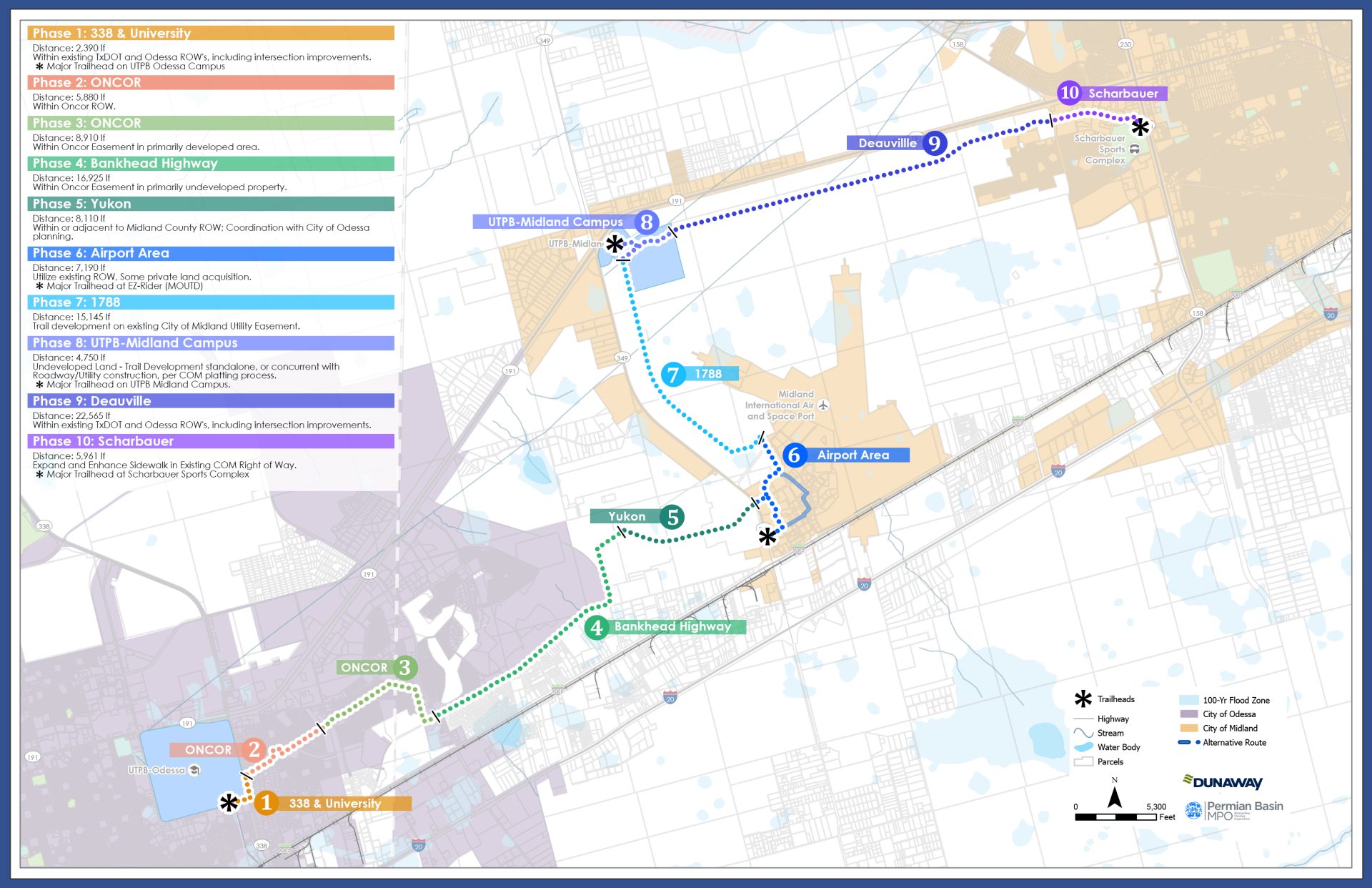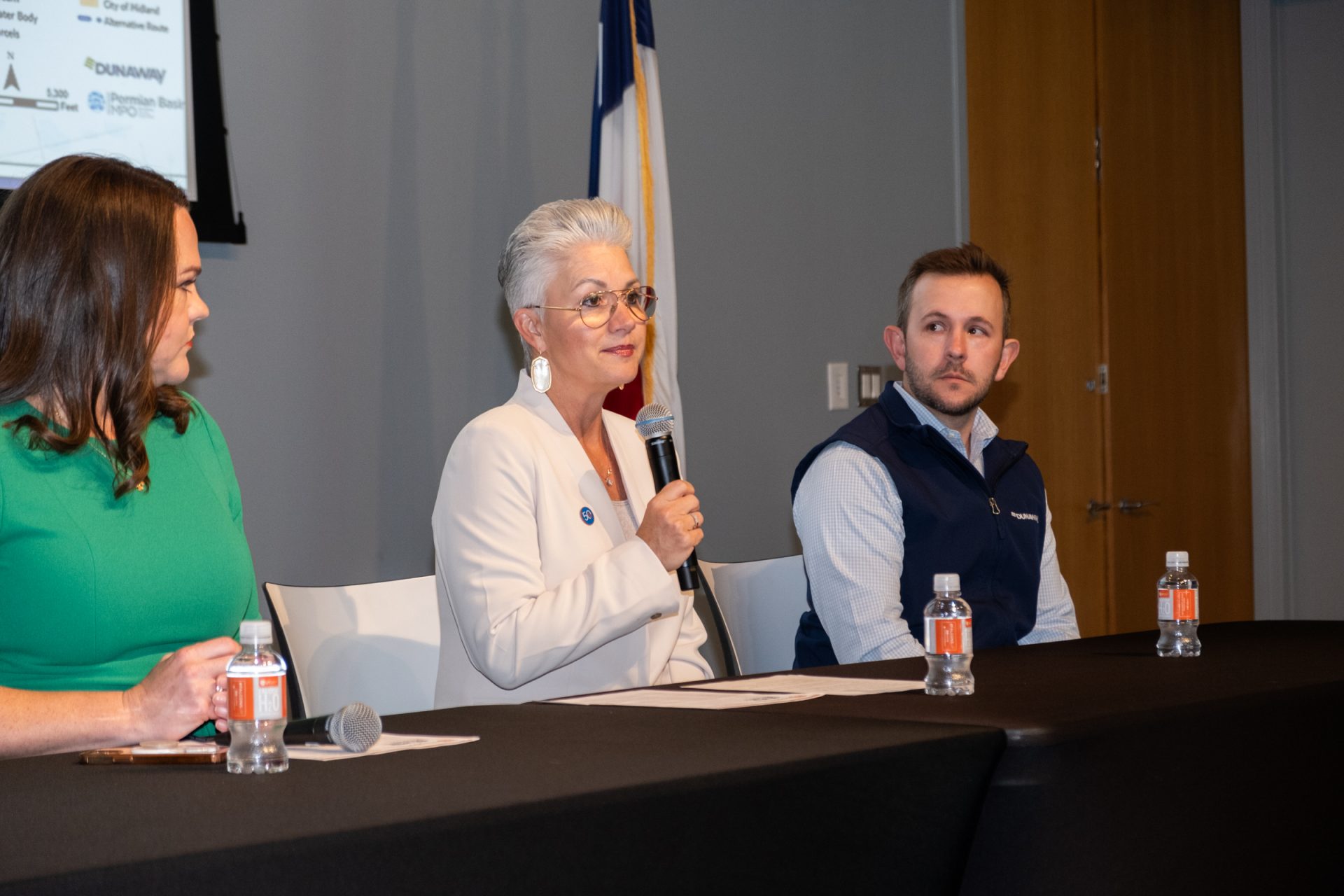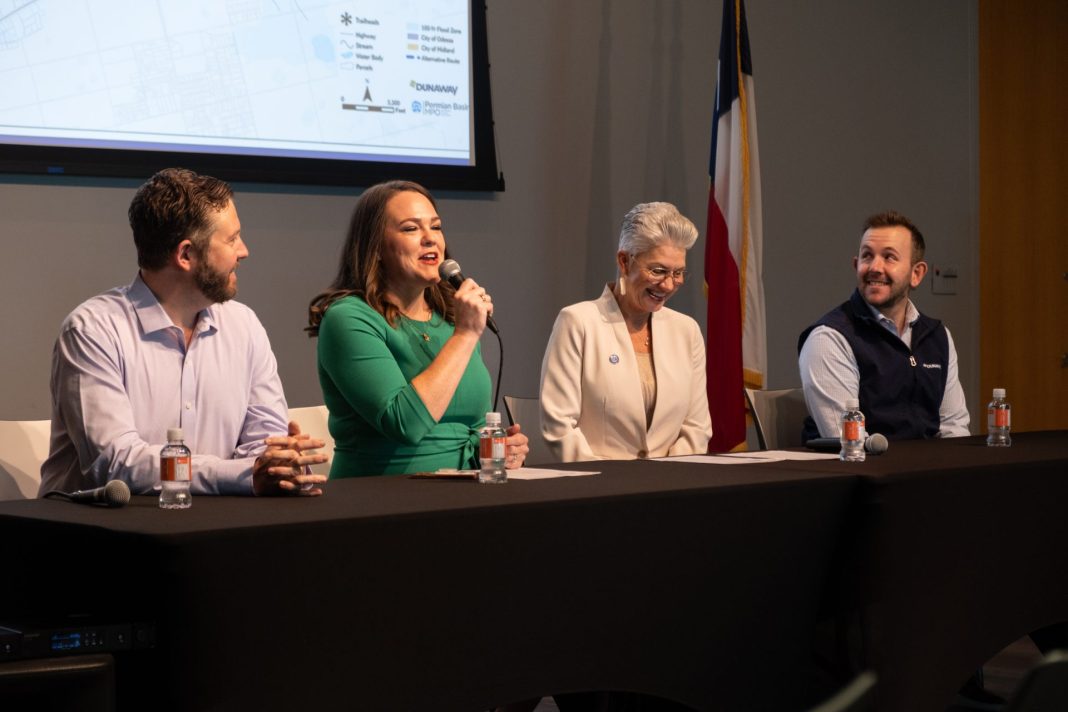Officials from the University of Texas Permian Basin and the City of Midland announced Tuesday that they have been awarded grants from the Texas Transportation Commission to start a 19-mile Wildcatters Trail between Odessa and Midland.
The announcement was made at the CEED Building. The City of Midland was awarded $3,697,495 and UTPB will receive $6,377,697.
The City of Odessa also applied for the grant, but was not funded. Details as to why were unavailable as of press time.
On Monday, Odessa Councilman Steve Thompson said he was unaware that the City of Odessa did not receive funding.
City spokeswoman Monica McDaniel said she didn’t know but would ask the city manager.
Midland council member Jack Ladd Jr., Midland Mayor Lori Blong, UTPB President Sandra Woodley and Tim Hair, regional executive with Dunaway, a design and engineering firm, were on hand to announce the grants and answer questions.
The Texas Transportation Commission announced Oct. 26 that it was awarding $345,110,072 in federal funds and up to $35,543,677 in transportation development credits to support a variety of bicycle and pedestrian planning and infrastructure projects throughout the state, a news release stated.
The Texas Transportation Alternatives Set-Aside Program distributes funds available for projects in non-urban, small urban and medium urban areas.
Woodley and Blong worked together on the grants to improve the quality of local spaces with safe and enjoyable trails in the Basin. A Wildcatters Trail committee made up of representatives from UTPB, City of Midland, City of Odessa, Metropolitan Planning Organization and industry leaders guide the planning for what will become a hiking, biking and running trail.
Blong said several running and cycling groups participated in the planning process.

The two initial grants will lead to future grant applications to fully fund the complete Wildcatters Trail. The estimated cost is $65 million.
The Wildcatters trail is planned to begin at UTPB’s Odessa campus, extend through the Midland campus near the Engineering building and the Wagner Noël Performing Arts Center and end at the Scharbauer Sports Complex in Midland.
Once the grant agreements are processed, the City of Midland and UTPB will post requests for proposals for each of their funded projects. Construction should begin at the Scharbauer Sports Complex in Midland and on the UTPB campus within the next year. This will be a multi-year collaboration, the release stated.
Hair said groundbreaking would likely happen in the middle part of 2025 “on the early side.”
“With it being federal funds administered by the state, some of the reporting requirements that go along with this money, it just takes a little bit longer than you would normally expect for the design process,” Hair said.
Woodley said these starter grants were awarded uniquely to UTPB. “So our work will start as soon as we get through the design process and all the approvals with the federal grant. (The) same is true for the City of Midland, so it could start simultaneously, depending on how the design goes. The money is available at the same time depending on that,” Woodley said.

She added that it will cost $65 million to complete the trail and those were early estimates. It may end up being a little bit more than that.
Blong said she believes Dunaway built in a pretty significant contingency. It also builds in right-of-way acquisition. Some of the trail is owned by UTPB and some by the City of Midland, but there is a significant amount that is privately owned.
“There’s a right-of-way acquisition component in that as well,” Blong said.
The fundraising efforts are not done, but she said this is the first success story.
Ladd said there would be chances to access CO2 reduction funds from the federal government to reduce carbon emissions and that could be up to $12 million.
“I would also like to encourage the counties of Midland and Ector, which didn’t have an opportunity to apply for the grant this year to apply for the grant and we could be looking at more than half the funding necessary to achieve this goal with just grant money alone. I really want to encourage the people of Midland and Odessa to give … and our wonderful companies here in town to consider this project a high priority for them because this is really going to improve our quality of life and safety and further connect our two towns. I like to look at it more like the transcontinental railroad. The two ends meet in the middle, but we’ll get a golden spike in there somewhere,” Ladd said.
Woodley said they are gearing up for a capital campaign right now.
The entities will have another chance to apply in two years.
Asked why the City of Odessa wasn’t awarded, Blong said they have no documentation of that. “The only thing we know is we’ve received letters for these two grants and the $10 million.”
She added that everyone submitted their grants at the same time.
Woodley said many years of work went into this, even before she arrived at UTPB.
“I’m really happy to be a part of it. When I think about the wellness and the opportunities that we have in the Permian Basin to elevate our quality of life, the trail certainly does come to mind. … Actually, I think the trail goes beyond hike and bike. I think it is also workforce development as well. I know in my own enterprise, hiring and keeping your professionals here in the Permian Basin can sometimes be a challenge and so part of what we need to do is meet the needs of all of the Permian Basin, including our young families and our old families like me that want to get out and safely get on a bike or hike, but also to bring the two cities together. I’m really excited about that,” Woodley said.
On a personal note, CC Serrato, who has worked for UTPB for 10 years, said her husband was hit from behind by a truck while biking on the State Highway 191 service road Oct. 31, 2012.
Serrato said her husband, Ricardo, ended up in the hospital with two small brain bleeds, his whole sacrum broken and no remembrance of that day.
“For us, it’s very personal, so (I’m) 100 percent in agreement with this initiative for this trail,” Serrato said.
She added that he also is a runner.
“I do not like for him to be out on these roads, so this would be an answered prayer, a safe place for people to ride and walk and run (and) hike,” Serrato said.




